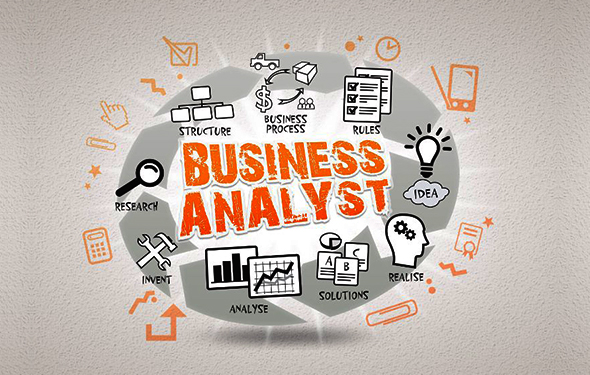Deliver Successful IT Projects by Hiring a Dedicated Business Analyst: Roles and Responsibilities
Business analysis does not just include recording the dictated requirements by business users. Instead, it is all about relevant questioning, having a clear understanding of the problem, and providing better suggestion for fulfilling all the requirements. Therefore, the role of a business analyst in any IT project is undoubtedly important. But before that, you should be aware of what exactly the term business analysis means.
What is Business Analysis?
By defining the requirements or identifying the areas that have problems, Business analysis is a process that enables change in enterprise. The process involves providing solutions such as component of software system development, and also consists of a process that leads to the improvement of organisational plan and strategic planning. And to perform all these tasks, an experienced business analyst is required.
The Roles of a Business Analyst
The success of information technology projects lies in the role of a Business analyst. The Business Analyst is the only person who can make sure whether all the requirements are appropriately captured and validated by the project team. Another important task is performing proper test coverage and delivery before providing the features to the customers. This position requires both hard skills and soft skills. The person has to know how to analyze, pull and report data trends and then share these details with others so that they can apply on the other side of the business. If you have a detailed idea about how systems, tools, and products work, you do not require an IT background in order to be fit for the position of a Business analysis.
To get a better clarification, take a look at the key roles of a Business Analyst:
- Extract requirements: In engineering IT systems, requirements play the key part. In case the requirements are incomplete and improper, it can usually lead to the failure of the project. Therefore, it is the primary role of a business analyst to determine the exact requirement of the project and then extract them from business or government policies. He/she can also extract it through interaction and research from the current and future users.
- Anticipate requirements: Any qualified and skilled business analyst should be aware of how quickly things can evolve in the dynamic world of IT. The subject of modification is the baseline plans and therefore, it is required to anticipate the requirements in the future. Otherwise, they will not be considered as successful outcomes.
- Constrain requirements: For successfully delivering a project, complete requirements are quite essential. Therefore, the primary focus should be on the core needs of the business, and not on the personal preferences of the users, functions related to trends or outdated processes, or other non-essential modifications.
- Organize requirements: From disparate and sometimes opposing sources, the requirements are originated. The related categories are used to effectively manage and communicate the organized requirements. According to their source and applicability, the requirements are sorted into various types. And a proper organization can prevent the project requirements from becoming overlooked, and thus result in optimum use of budgets and time.
- Translate requirements: The primary role of a business analyst is to adapt the process of translating business requirements to technical requirements. Powerful analysis and modelling tools are included here to match the business objectives with all the technical requirements.
- Safeguard requirements: In the project life cycle at regular intervals, the business analyst contributes a lot in safeguarding and protecting the business and all the requirements of the users by verifying the requirements, functionality, accuracy and completeness with all the original initiating documents. Safeguarding helps to minimize risks by ensuring that before any further investment in system development, the requirements are met.
- Simplify requirements: At all times, the business analyst emphasizes specially on simplicity and ease of use along with the implementation. The goal of every IT project lies in meeting all the business objectives. And business analysts successfully identify and avoid all the activities that are extraneous and that does not help to solve any problem to reach the objective.
- Verify requirements: The business analyst should reject implementations and verify the requirements continuously that do not advance business objectives. To verify all the requirements, one has to go through a few processes such as analysis, testing, demonstration and inspection.
- Managing requirements: Typically, where project schedules, costs and duration estimates are updated, a formal requirements presentation, review and approval session also occur. This eventually helps to revisit all the business objectives. For the rest of the IT solution life cycle, the business analyst transitions all the management activities and operation maintenance based upon the approval.
- System and operations maintenance: After all the requirements are fulfilled and the IT solutions are delivered, the role of the business analyst shifts to preventing and correcting defects, maintenance, enhancements, providing system validation procedures, maintaining plans, reports and documents, etc. Another important role of a business analyst is to analyze the system and determine when the deactivation and replacement are required.
Bottom Line…….
From the above discussion, we can conclude that having a dedicated Business Analyst on the project will eliminate the need to rework and the requirements can be properly understood and delivered to the project team.
Therefore, in order to plan the requirement sessions appropriately, at first, it is very much essential to understand the organization size, culture, and presence across single or multiple locations. The stakeholders’ availability and their active participation at the meetings can only be done by planning a crucial phase and carry it out correctly.
In business analysis, there are various roles that are performed, but a business analyst who is appropriately trained will make sure effective requirements gathering, understand the end-user and strategic requirements, and address the gap between them, use excellent techniques to capture requirements, and make effective documentation of requirements and transfer the data among team.
According to the research which is done over the years, it has been seen that 90% plus success is assured when a dedicated Business Analyst is assigned over a project. And the chances of failure is 40% provided there is no assigned dedicated business analyst. Therefore, if you are thinking that a business analyst is a unnecessary, then you are probably wrong. The main role of a skilled and dedicated business analyst is to ensure the delivery of a successful project and pay for itself many times over.
Frequently Asked Questions
- What is the role of a Business Analyst in a project?
By outlining what tasks project managers and business analysts are generally responsible for during the completion of project, one can clear up this confusion of role. On the other hand, business analysts are primarily concerned with the end product and make sure that it can meet all the requirements and demands of the stakeholders’ project key.
- Is Business Analyst a product owner?
In case of the some projects, the product owner is the agile business analyst, but they work effectively on the behalf of the business. This essentially happens more on internal projects, as opposed to a business analyst from a vendor operating as the product owner on behalf of an external client.
- What’s a product owner?
The scrum development role for a person is referred as the product owner. The primary role of a product owner is to represent the business or user community. The product owner is also responsible for working with the user group which will help to determine what features of the product are needed to be released.
- What do you mean by a Business Analyst?
One who can analyze an organization or business domain and documents is referred to as a business analyst. Besides, he/she also verifies the business or processes or systems. The role of a business analyst is also to assess the business model or its integration with technology.
- How can I improve my Business Analyst skills?.
- Understand what you are looking for
- Use a variety of tools
- Consider the Positives and Negatives.
- Search for the underlying causes.
- Understand your Organization.
- Present all the conclusions meaningfully.







